Something
behind the human eyes
Deeper than
the intellect
Perceives
these little things
Immediately
Those polished
hands of the god
Betokened the
number of days
In a
year.
They were
sculpted by an Initate
Who understood
all the symbols surrounding all the gods.
And I see in
my vision
That in order
to undress the mystery
Of passing
time, of a passing annum
And to explain
the mystery
Of a coming
one
In which all
days that end
Lead to this
one that begins another new year.
That there is
a gateway the tutelary god of the door operates
An
investigation of spaces connected to one another,
Like hinges on
the door of time as it passes and moves on
As things change yet endure until they vanish
As things change yet endure until they vanish
Because there
is genius that abides in doorways.
Knowing which
doors to take in life takes genius
As one rides
the very tip of the primal vajra lightning bolt
To discern the
meanings of the gods.
In a vision
I stand
outside the gates of the city before dawn.
I have come to
an ancient precinct
On an island
cradled in the Tiber river delta
Ramifying
through this land.
I have come to
this site's inauguration
Dressed in
fine robes. It is thousands of years ago.
I stand and
observe the priests as would minor royalty
Here two solar pillars stand bathed in the first
rays
Of the
earliest reckoning of this god,
Gleaming on
the eastern side of this sacral complex.
Each pillar in
turn fully illuminated
By an exact
beam striking it
At the moment
of solsticial sunrise.
This
knowledge, you realize, was hard come by.
The profuse
sweat of the human march of knowledge and civilization
To stand
before this and all god images
And extract
from them sapience and science
Of cosmic
principle.
Today I stand
alone positioned near the southern pillar.
It is the
pillar of winter solstice.
I witness it
transform over the long progression of history
Into a single
column representing two torsos
And finally a
single body with two heads
Looking in
opposite directions.
…………………………………..
I can't help
but look at the threshold
Of a new year
And not
consider it all a part of mythology
And
subsequently an occasion
For a
mythologizing of my own life
And its
anagogy, which I leave to my blood to solve
And I read
about Janus
At midnight,
New Year's eve
Modern
scholars have conjectured that the name Janus derives from the Indo-European
root meaning transitional movement (cf. Sanskrit "yana-" or Avestan
"yah-", likewise with Latin "i-" and Greek "ei-".).[10]
Iānus would then be an action name expressing the idea of going, passing,
formed on the root *yā- < *y-eð2- theme II of the root *ey- go from which
eō, ειμι.[11] Other modern scholars object to a Indo-European etymology either
from Dianus or from root *yā-.[12]From Ianus derived ianua
("door"),[13] and hence the English word "janitor" (Latin,
ianitor).
Interpretations
concerning the god's fundamental nature either limit it to this general
function or emphasize a concrete or particular aspect of it (identifying him
with light, the sun, the moon, time,
movement, the year, doorways, bridges, harbors, etc.) or else see in the god a
sort of cosmological principle, interpreting him as a uranic deity. He too holds
the access to Heaven and to other gods: this is the reason why men must invoke
him first, regardless of the god they want to pray or placate. He is the
initiator of human life, of new historical ages.
While Janus
sometimes is named belliger[165] and sometimes pacificus[166] in accord with
his general function of beginner, he is mentioned as Janus Quirinus in relation
to the closing of the rites of March at the end of the month together with Pax,
Salus and Concordia:[167] This feature is a reflection of the aspect of Janus
Quirinus which stresses the quirinal function of bringing peace back and the
hope of soldiers for a victorious return.[168][169]
As the rites
of the Salii mimic the passage from peace to war and back to peace by moving
between the two poles of Mars and Quirinus in the monthly cycle of March, so
they do in the ceremonies of October, the Equus October ("October
Horse") taking place on the Campus Martius[170] the Armilustrium,
purification of the arms, on the Aventine,[171] and the Tubilustrium on the
23rd. Other correspondences may be found in the dates of the founding of the
temples of Mars on June 1 and of that of Quirinus on June 29, in the pre-Julian
calendar the last day of the month, implying that the opening of the month
belonged to Mars and the closing to Quirinus. The reciprocity of the two gods'
situations is subsumed under the role of opener and closer played by Janus as
Ovid states: "Why are you hidden in peace, and open when the arms have
been moved?"[1 in the Metamorphoses he records his fathering with Venilia
the nymph Canens, loved by Picus, first legendary king of the Aborigines.[188]
I realize how
ancient this god is
This god of
rational observation
Always in the
mid-ground of creation, present at the next step
As he was
present at the first movement, a direct observer
But not the
author.
Yet the divine
resident at the limen of it, moment after moment
A mediary, but
an absolutely indispensible one
Present at the
beginning of time,
Not the god of
time nor the god of space
But the observer of these principles,
The All-Seer
of their unfoldment.
Magister of
the Manifest,
But pressing
the limen, that mysterious friction
An
adminstrator of the threshold
Of chaos and
order, of expansion and contraction -
Of opening and
closing,
Of transit and
transition
He presided
over the concrete and abstract
Organized
around a single principle:
Presiding over
all beginnings and transitions, whether sacred or profane.
This deity
stationed always in the mid-ground.
Not a source,
but a mediary, a doorway.
Magister of
the Manifest,
Of past to
future,
Again, not the
god of time and space,
But the
rational observer of these rational properties
That were
particularly Roman in their character.
There were other
gods
Of one
state flashing out of itself
To
another flashing out of itself
Of one vision
to another,
And of one
galaxy to another,
These were all
worshipful mysteries
That dwelt in
the hands of this god
And the pantheon he was the gatekeeper for and father of.
And the pantheon he was the gatekeeper for and father of.
So powerful
this god, Janus, who presided over
The beginning
and ending of conflict,
And hence war
and peace
Even the most
uranic of gods
Were
vouchsafed transit
Between Heaven
and Earth
Only because
of His passageway
That let the
gods pass to and fro.
One had to
pray
To this deity
before any other
If one wished to invoke
Some god or
goddess
For boon or
succor.
The god of the
gateway,
And
beginnings, those of the first of harvest
And seed
time. He was worshipped then.
And marriages
and births, too. These were
His paternal
dominion.
Between
barbarity and civilization,
The rural and
the urban, and between
Youth and
adulthood.
Having
jurisdiction over beginnings
Janus had an
intrinsic association with omens and auspices.
He set the
limen and ordered the sequentialness
Of endless
transition
Between
Contraction/expansion,
center/circumference, peace/war
The gates
between the past and the future
In constant
transition
,,,,,,,,,,,,,,,,,,,,,,,,,,,,,,,,,,,,,,,,,,,,,,,,,,,,,,,,,,
For a man
outside the gate there is, at most times, no enduring order.
Only a life of
confusion with sad prospects.
Having been
forsaken by an ordinary existence many years past
I made it out
past the city gates, into the realm of The Charioteer.
But paid an
enormous price for my freedom.
Now there is
only my mysterious doing
Of building in
the wide open of formlessness.
That is its
enduring order.
In the passage
of time only the doing of the god,
The shaping of
transition
Between two
worlds, the world of ordinary lives
Of men and
women and the world as it really is,
Mysterious –
and jealous of its mysteries
This is the
world of time and attention, where all is made of time.
Attention the
house of awareness, at the doorway of consciousness
Crossing the
river to leave the Rome of the domestic mind,
Perhaps never to return,
Perhaps never to return,
Leaving the
known world, leaving terra cognita
No familiar
landmarks, only phantom travelers
Crossing phantom bounds
Every moment,
Every moment a
wrinkle in time on the face of godhead
And every new
year a wrinkle on mine.
Take hold of
the key and open the gate, it opens with words
For it is more
than a new day.
It is a new
year.
Step outside
the gates everyday
And cross into
chaos.
Construe the
way through the marvelous dust of time
That blows
fresh each day
Inside a
disguise of a human mask
Into the
abstract of the Spirit
In order to
find the one
Who will
someday die
And therein
find the one
Who will
never.
To find the one
who will someday
Find the words
to express this feeling
When the time
comes.
Beneath the
archway
The dust is
fresh
With every new
day
And one steps
beyond the city
Gates of the
mind
Into chaos
every moment
Crossing the
brink until we see
That through
our doing that we make the world.
If we didn't
know the doing of the world
It would be a
different reality.
Perception is
the hinge of the gateways of creation.
A man is as he
perceives in his Imagination.
Stand here at
the transition of the new year
Although you
may have never
In a million
years imagined
That there
would be a day
That you would
be, knowing
That all
roads, all roads lead to this gate
And that all
doors, all doors lead to this door.
Do you see the
chaos before you?
Which is more
insane,
It or the
rational Order?
Be like Janus
and look
Both ways.
Raise a toast
to the madness of life!
Celebrate not
merely the anniversary of a new year
Like there
were no tomorrow. No,
Celebrate the
diaversary, a new word and
A new day
And realize
today
That the nearly infinite resides in man's passions and his will to know;
It is a state of
being.
Balancing the
terror of being a man with the wonder of being a man
Requires the
assistance of the gods,
Requires
something ancient to rest in.
And I read on
about his solar godhood:
A similar
solar interpretation has been offered by A. Audin who interprets the god as the
issue of a long process of development, starting with the Sumeric cultures, for
not only does he hold the entry to January, but to all the months: indeed all
the kalends are under the jurisdiction of Juno". ". The Winter
solstice was thought to occur on December 25. January 1 was new year day: the
day was consecrated to Janus since it was the first of the new year and of the
month (kalends) of Janus: the feria had an augural character as Romans believed
the beginning of anything was an omen for the whole. Thus on that day it was
customary to exchange cheerful words of good wishes.[140] For the same reason everybody
devoted a short time to his usual business, exchanged dates, figs and honey as
a token of well wishing and made gifts of coins called strenae. Cakes made of
spelt (far) and salt were offered to the god and burnt on the altar. Ovid
states that in most ancient times there were no animal sacrifices and gods were
propitiated with offerings of spelt and pure salt. This libum was named ianual
and it was probably correspondent to the summanal offered the day before the
Summer solstice to god Summanus, which however was sweet being made with flour,
honey and milk.The rite of the bride's oiling the posts of the door of her new
home with wolf fat at her arrival, though not mentioning Janus explicitly, is a
rite of passage related to the ianua. Shortly afterwards, on January 9, on the
feria of the Agonium of January the rex sacrorum offered the sacrifice of a ram
to Janus.
The rites
concerning Janus were numerous. Owing to the versatile and far reaching
character of his basic function marking all beginnings and transitions, his
presence was ubiquitous and fragmented. Apart from the rites solemnizing the
beginning of the new year and of every month, there were the special times of
the year which marked the beginning and closing of the military season, in
March and October respectively. These included the rite of the arma movēre on
March 1 and that of the arma condĕre at the end of the month performed by the
Salii, and the Tigillum Sororium on October 1. Janus Quirinus was closely
associated with the anniversaries of the dedications of the temples of Mars on
June 1 (a date that corresponded with the festival of Carna, a deity associated
with Janus) and of that of Quirinus on June 29 (which was the last day of the
month in the pre-Julian calendar).
Any rite or
religious act whatever required the invocation of Janus first, with a
corresponding invocation to Vesta.
Morning
belonged to Janus: men started their daily activities and business. Horace
calls him Matutine Pater, morning father.[148] G. Dumézil thinks this custom is
at the origin of the learned interpretations of Janus as a solar deity.[1
Janus was also
involved in spatial transitions, presiding over home doors, city gates and
boundaries. Numerous toponyms of places located at the boundary between the
territory of two communities, especially Etrurians and Latins or Umbrians, are
named after the god.[150] The most notable instance is the Ianiculum which
marked the access to Etruria from Rome.[151] Since borders often coincided with
rivers and the border of Rome (and other Italics) with Etruria was the Tiber,
it has been argued that its crossing had a religious connotation; it would have
involved a set of rigorous apotropaic practices and a devotional attitude.
Janus would have originally regulated particularly the crossing of this sacred
river through the pons sublicius.[152] The name of the Iāniculum is not derived
by that of the god, but from the abstract noun iānus, -us.[153][154] Adams
Holland opines it would have been originally the name of a small bridge
connecting the Tiber Island (on which she supposes the first shrine of Janus
stood) with the right bank of the river.[155] However Janus was the protector
of doors, gates and roadways in general, as is shown by his two symbols, the
key and the staff.[156] The key too was a sign that the traveller had come to a
harbor or ford in peace in order to exchange his goods.[157]
Ancient.
I write a poem
to Janus and the space he once and forever will govern.
I write a poem
to poets who only write one poem a year.
I write a poem
to poets who write a poem every day.
I bid them
find the gateway of poetry in the coming new year
And find
something fresh and new in the ancient field of poetry.
May the key of
the traveler open doors to a harbor of peace
In exchange
for a few poems written in satisfaction
of their unique beauty
And may the
ancient god be remembered as we stand at the doorway of a new year.








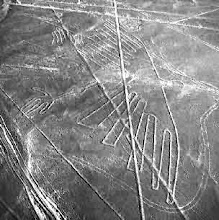

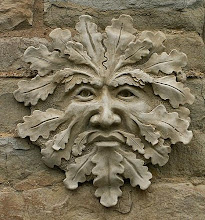


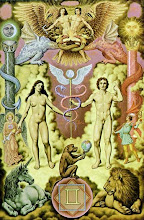
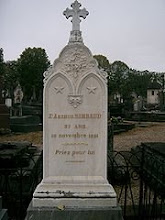


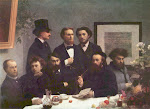
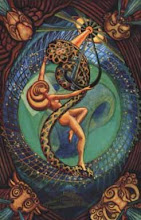


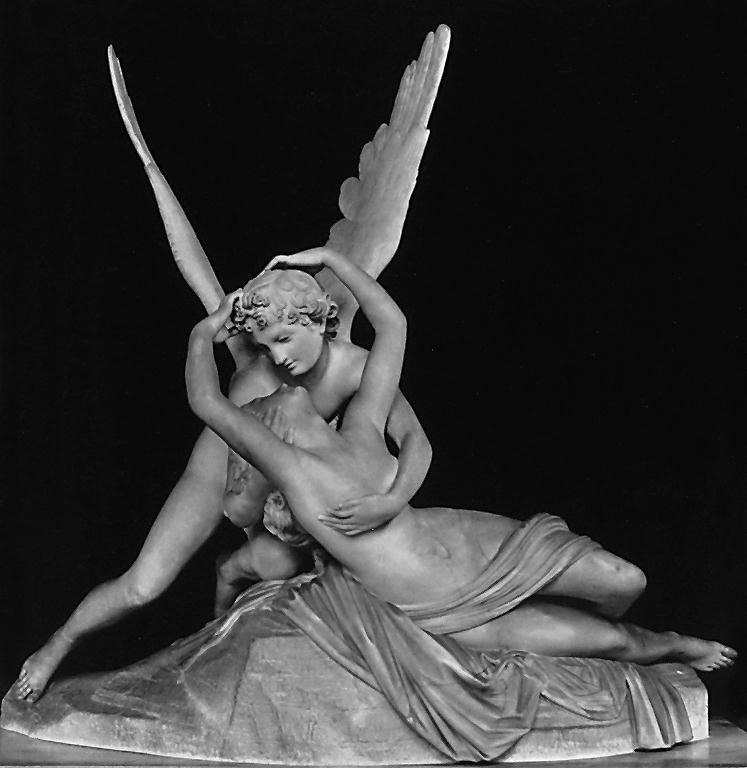
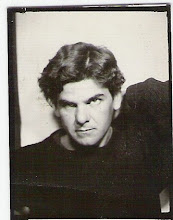

No comments:
Post a Comment